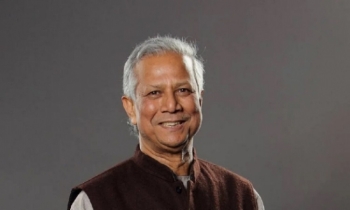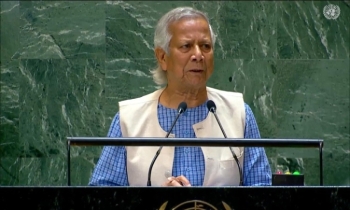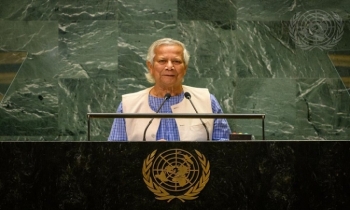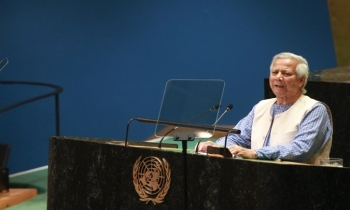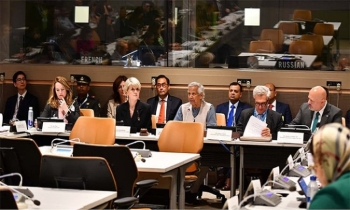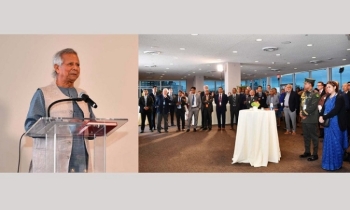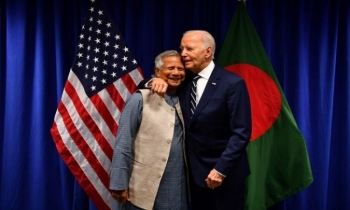US seeks ‘unified voice’ from Myanmar`s all neighbours for Rohing
‘Every major country in Indo-Pacific should be speaking with equa
BI Report || BusinessInsider
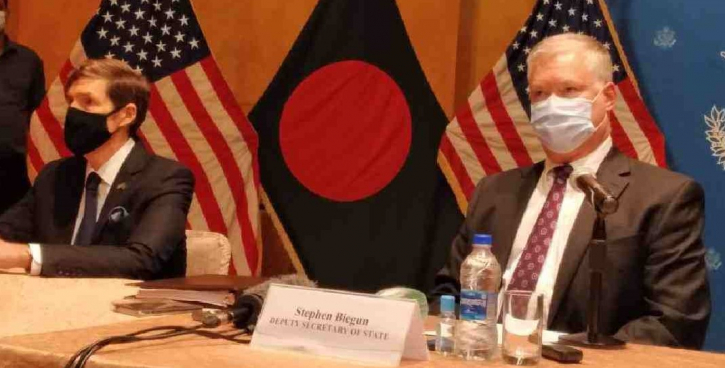
Photo: Collected
Dhaka (Oct 18, 2020): The United States has sought an equal role from Myanmar’s all neighbours with “broad and unified voice” so that Rohingyas can get the confidence back to return to their homeland without any fear of further deportation.
“We need every single one of Myanmar’s neighbours [to have that done],” said US Secretary of State Stephen E Biegun while responding to a UNB question at a roundtable discussion with a select group of journalists.
Myanmar is bordered by Bangladesh and India to its northwest, China to its northeast, Laos and Thailand to its east and southeast, and the Andaman Sea and the Bay of Bengal to its south and southwest.
He encouraged all Myanmar’s neighbours to be quite clear about the expectations they all have regarding the treatment of Rohingya people and creation of a safe environment to help Rohingyas return to their homes, reports UNB.
Biegun made it clear that this is not simply the responsibility of the government of Bangladesh, as generous as that government has been.
“This is a global priority and one that every major country in the Indo-Pacific should be speaking with equal outspokenness to the government of Myanmar to take the steps necessary to ease this crisis,” he said adding that they need to find out every possible means.
Biegun laid emphasis on international cooperation and collaboration staying outspoken like the US so that Myanmar makes sure Rohingyas will no longer be mistreated and they have confidence to start returning to the Rakhine State.
The Deputy Secretary of State said the US has been “quite outspoken” and used its “political influence” as much as possible to influence decisions inside Myanmar regarding the treatment and restoration of rights of these people.
He emphasised that this requires a regional and a global response. “All countries need to work together shoulder to shoulder.”
Biegun said they very much agreed with the government of Bangladesh that a solution needs to be found to restore the rights and right of return of the people who are currently in camps in Cox's Bazar.
“We’ve to meet their immediate humanitarian needs, but we also have to redouble our efforts in the international community to reach a long-term solution,” he said.
During his recent visit, the US Deputy Secretary of State discussed the challenges and ways to get a permanent solution so that the government of Bangladesh and the people of Bangladesh do not permanently have to carry the weight of this on their own shoulders.
“The United States, of course, has been a very supportive partner. We’ll be raising a substantial amount of additional humanitarian assistance together as we seek to work for a more permanent solution to the resolution of that crisis,” Biegun said.
Bangladesh wants the presence of Myanmar leader Aung San Suu Kyi as China proposed to hold a tripartite meeting to discuss Rohingya repatriation issues in Beijing.
“It won't be done without her presence. She should be there,” Foreign Minister AK Abdul Momen conveyed to China.
Though Suu Kyi, the State Counsellor of Myanmar, was awarded the Nobel Peace Prize and she has been widely criticised for doing nothing to stop rape, murder and genocide in Rakhine by refusing to condemn the powerful military or acknowledge accounts of atrocities.
The Foreign Minister said the number one objective of Bangladesh is to see the repatriation of Rohingyas to their place of origin in Rakhine State.
Chinese Ambassador to Bangladesh Li Jiming proposed to hold a tripartite meeting among Foreign Ministers of the three countries -- Bangladesh, Myanmar and China.
The Foreign Minister recently said Rohingyas will "jeopardise regional and international security" if the 1.1 million Rohingya people are left unattended and not given the opportunity to return to their homeland.
Donors Conference
The United States, the European Union, the United Kingdom, and the United Nations High Commissioner for Refugees will cohost a donor conference on October 22 to promote support for Rohingya refugees and host countries.
Biegun said the United States is proud to stand with the UK, the EU, and the UN High Commissioner for Refugees as partners in leading this call to sustain the international crisis response to assist Rohingya refugees and other displaced people, as well as strengthen investment in affected host communities.
“As the world’s most generous donor, we’re a catalyst for the international humanitarian response and call on others to contribute to this cause – both longstanding partners as well as new and aspiring donors,” he said.
The conference is seen as an opportunity for the cohosts to reiterate that any sustainable solution to this crisis must include the voluntary, safe, dignified, and sustainable return of Rohingya refugees and other displaced people to their homes or to a place of their choosing.
There is a significant funding gap in the international response to the crisis this year, with contributions to date covering less than half of what is needed.
The 2020 Joint Response Plan (JRP) for the Rohingya humanitarian crisis is so far 48.2 percent funded and remains vital to sustain lifesaving preparedness and response efforts for extreme weather events, which have become more challenging during the Covid-19 pandemic, says the United Nations.
The co-host will call on the international community to provide much needed funding to assist Rohingya refugees, host communities, and internally displaced people in Myanmar.
At a virtual conference, they will urge countries to increase assistance for Rohingya refugees, host communities, and internally displaced people in Myanmar, more than three years since the latest phase of the crisis began in August 2017.
The UN has appealed for more than $1 billion in aid to meet the humanitarian needs of Rohingya refugees in Bangladesh this year, but so far less than half has been contributed. This leaves a significant funding gap, made worse by the Covid-19 pandemic.
The UK’s Foreign Secretary Dominic Raab said the Rohingya people have faced horrific brutality and were forced to flee their homes in the worst circumstances imaginable.
“We’ve taken action against the architects of this systemic violence, including through sanctions, and we’ll continue to hold those responsible to account,” he said.
The UK has also been a leading donor since 2017 to alleviate humanitarian suffering of the Rohingya.
The world must wake up to the severity of their plight and come together now to save lives," Raab said.
Repatriation attempts failed twice in November 2018 and August 2019 amid Rohingyas' "lack of trust" in the Myanmar government.
Bangladesh and Myanmar signed the repatriation deal on November 23, 2017.
On January 16, 2018, Bangladesh and Myanmar signed a document on “Physical Arrangement”, which was supposed to facilitate the return of Rohingyas to their homeland.


